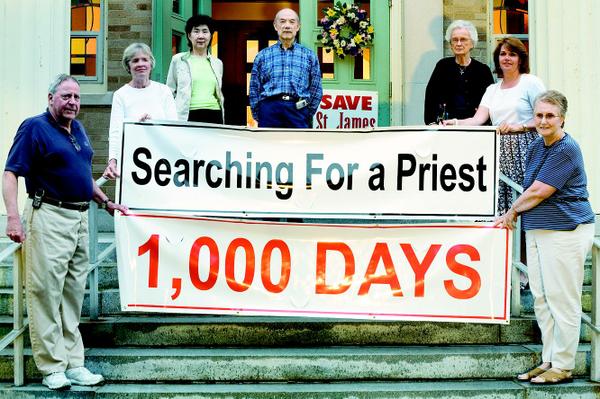By Brad Reed
The Wellesley Townsman
July 26, 2007
http://www.townonline.com/wellesley/homepage/x986380538
Wellesley - For nearly 1,000 days, a group of parishioners from St. James the Great parish have held a vigil in hopes of striking a deal to save their Route 9 church.
Since St. James closed in October 2004, more than 100 parishioners have taken turns living inside the church and maintaining vigil for 24 hours a day, seven days a week. In that time, they have also made several appeals to both secular and canon law to keep their parish open and prevent the Archdiocese of Boston from selling the 8-acre parcel where it rests. The most recent court decision on the parish came in May, when the Massachusetts Supreme Judicial Court ruled that the archdiocese owned the deed to the St. James parish property in Wellesley, and would be within its legal rights to sell it. Yet as the 1,000th day of vigil approached, some parishioners expressed hope this week that they would ultimately get their parish back.
"I'm hopeful because most recently the committee that was formed by Cardinal [Sean] O'Malley of both clergymen and laypeople came back and said they have to stop the church closings," said parishioner Kathleen Daly of Wellesley.
 |
| The parishioners at St. James the Great plan to commemorate their 1,000th day of maintaining a vigil this Saturday with a lay-led community service and church picnic. From left: Jim and Kathleen Love, Carol and Frank Chin, Betty Elliott, Suzanne Hurley and Kathleen Daly. The parishioners at St. James the Great plan to commemorate their 1,000th day of maintaining a vigil this Saturday with a lay-led community service and church picnic. From left: Jim and Kathleen Love, Carol and Frank Chin, Betty Elliott, Suzanne Hurley and Kathleen Daly. Photo by Zara Tzanev |
"As long as there's communication, there's hope," said parishioner Suzanne Hurley of Natick. "And I think they're realizing that we're not going away … [the archdiocese leaders] have got to come to the realization that the people sitting in these pews are the true gold of their church. We're the ones that are willing to stand, to sit, to sleep for our faith."
Despite her optimism about ongoing dialogue, Hurley said she was far less trusting of the archdiocese than she had been four years ago.
"I think for years many of us would come here and we'd sit, pray, pay and obey," said Hurley, who has been in the church with her husband for the past 18 years. "And suddenly, when you spend a couple of years listening to what [the Boston Archdiocese] chose to hide, you realize that your faith is yours. I don't need the archdiocese to give me my faith."
Some parishioners also criticized the archdiocese for closing local parishes without considering any alternatives. In particular, they cited the example of the Los Angeles Archdiocese, which recently reached a $660 million settlement with victims who were sexually abused by church clergy, and which vowed not to close any parishes in order to save money. With some creative thinking, they said, the archdiocese could find a way to pay off its legal expenses and still keep all of its parishes open.
"Both the Spokane and Los Angeles archdioceses solved their problems without closing any parishes," said Daly. "What has happened here is that … certain parishes are asked to sacrifice everything."
"A very simple solution which would help in this whole process would be if they'd just assign us a priest one hour a week to say Mass in St. James Church," said Wellesley parishioner Jim Love.
"I think the archdiocese should have an open mind and they should communicate more often with us, and see our options," said Wellesley parishioner Frank Chin, who was married to his wife, Carol, at St. James in 1962. "I'm very encouraged by the recent $660 million settlement in Los Angeles. They said closing churches [in the Los Angeles area] is not even an option. It's out of the question."
Looking forward, the parishioners said they were focusing on pressing their case to the Vatican through canon law. The Council of Parishes, an umbrella organization that represents Catholics whose parishes have faced forced closure, is currently appealing several area church closings to the Vatican's Apostolic Signatura, the church's highest court for property matters. The Vatican has temporarily suspended the archdiocese's suppression decree until the Apostolic Sigatura reached a decision.
But beyond the legal appeals, the parishioners said they didn't know how much longer their vigil in St. James would last.
"It is sort of one day at a time, and it could go on for another 1,000 days," said Love. "How do you measure commitment?"
The St. James parishioners plan to commemorate their milestone day this Saturday with a lay-led community service at 4 p.m. and a barbecue picnic afterward.
Representatives from the archdiocese did not return calls seeking comment for this article.
Any original material on these pages is copyright © BishopAccountability.org 2004. Reproduce freely with attribution.